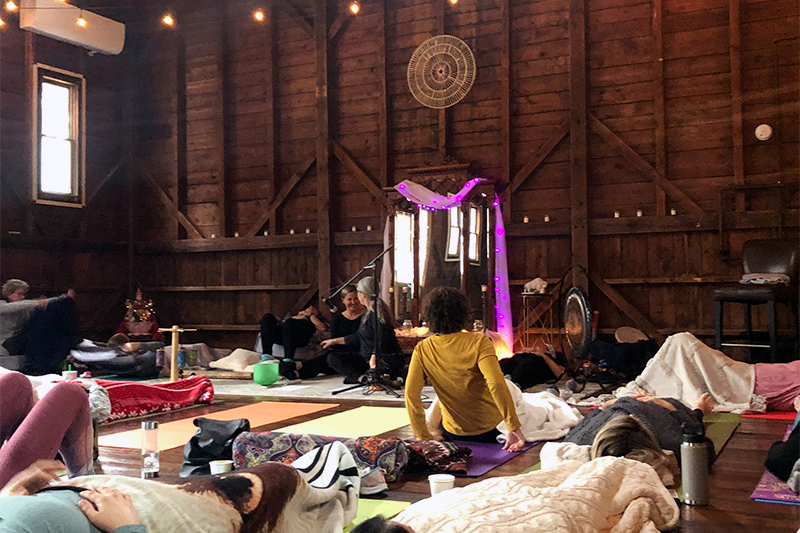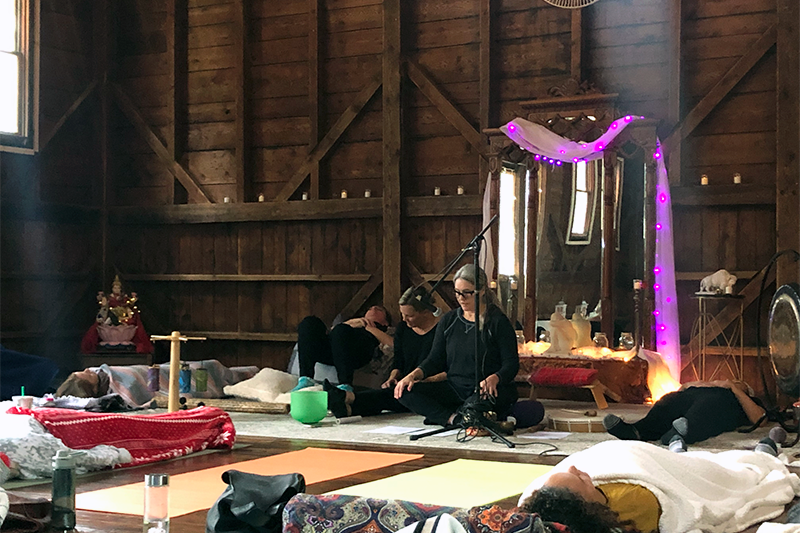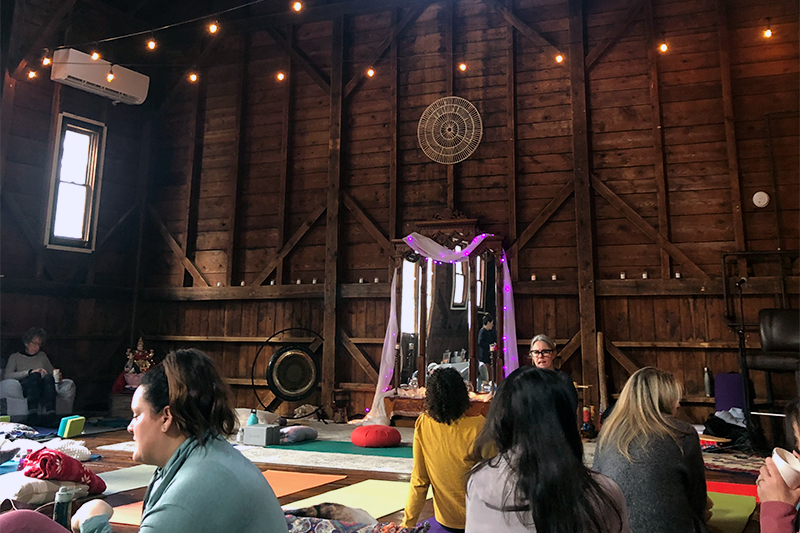
Leaning into self-care for renewal and restoration
Many of us are familiar with work retreats, but there is also value in leveraging them for personal wellbeing. If you follow my blog, you know that I advocate Self-Care For Disaster Professionals. Additionally, business resilience is achievable by addressing employee wellbeing. So, if you are interested in exploring more about the topic, I check out my podcast with Katie Belfi and her thoughts on A Holistic Approach to Resilience.
A good friend asked me to join her at a women’s event on the South Shore of Massachusetts. At first, I was reluctant and used all of the usual excuses that one gives not to engage in weekend events. I thought I was too busy, but after a week where I truly needed a reset for both mind and body, I am glad she convinced me to sign up. I had no idea what to expect from the Renew Womens Wellness Retreat. Sponsored by the JPH Organization, it promised a “Renew and Restore Retreat with a day of Ayurvedic Yoga, Mindful Art Therapy,Qigong and meditation.” Once the day of the event rolled around, I was ready to embrace the opportunity head-on. Below is an overview of the day’s activities with a description of the benefits.

What is a wellness retreat?
A wellness retreat is a vacation or program that promotes physical, mental health and wellness. This includes yoga, meditation, healthy eating, fitness classes, and workshops on stress management and mindfulness. The goal is to provide a peaceful and supportive environment for individuals to prioritize their well-being and return home feeling rejuvenated.
Women’s wellness retreats can vary, but generally, they are designed for women that emphasize improving physical, emotional, and mental well-being. Retreats offer a range of activities and workshops that cater to women’s specific needs, such as stress management, self-care, nutrition, fitness, and mindfulness. Additionally, they provide a supportive and empowering environment for women to connect, reflect on their personal growth, and engage in activities that promote their overall health and wellness. The focus varies, with themes such as stress reduction, body positivity, self-discovery, etc.

Benefits of yoga
Yoga offers numerous physical, mental, and emotional benefits. Some of the most commonly noted benefits include:
- Physical benefits: Improves flexibility, balance, strength, and posture. It can also help relieve pain and discomfort in the back, neck, and joints.
- Mental benefits: Reduces stress, anxiety, and depression. Improves focus, concentration, and overall sense of well-being.
- Emotional benefits: Boosts self-esteem, promotes inner peace and calmness and helps individuals develop a more positive outlook on life.
- Cardiovascular benefits: Boosts heart health and can help lower blood pressure.
- Respiratory benefits: Improves lung capacity and helps to regulate breathing.
- Stress relief: Yoga helps to manage stress through breathing techniques, meditation, and physical postures.
Of course, it’s important to remember that individual results may vary and that it’s always a good idea to consult a doctor before starting any new exercise regimen.

Art therapy - you don't have to be an artist
Art therapy is a form of psychotherapy that uses art-making as a means of self-expression and exploration. It’s based on the belief that the creative process of making art can help individuals improve their emotional well-being, cope with stress and trauma, and achieve greater self-awareness. And, it is often used as a complementary treatment in combination with other forms of therapy. It can be helpful for individuals with mental health conditions such as depression, anxiety, and PTSD, as well as those without a specific diagnosis.
During art therapy sessions, a licensed art therapist may guide clients in creating artwork, but the focus is on the process of making art rather than the end product. The therapist uses the artwork and the individual’s thoughts and feelings to explore and work through emotional challenges. Art therapy provides a safe and non-judgmental space for individuals to express themselves, build coping skills, and make positive life changes. The best part is that artistic talent is not required. However, you may have more skills to express yourself than you thought after engaging in a session.

The many benfits of meditation
Meditation is a practice that involves focusing the mind on bringing about a state of mental and emotional calmness and clarity. It is often used to reduce stress, improve concentration, and promote overall well-being. It can be practiced in various ways but typically involves sitting or lying in a comfortable position, closing the eyes, and focusing on the breath or a specific word, sound, or image. The goal is to clear the mind and eliminate distractions, allowing the individual to achieve a state of relaxation and inner peace.
Meditation can be practiced for a few minutes at a time or for extended periods and can be done alone or in a group setting. There are many different types of meditation, including mindfulness meditation, loving-kindness meditation, and guided meditation. While the specific technique can vary, the general aim is to cultivate inner peace and calm, leading to improved mental and emotional well-being.

The value of self-care
So, with my recent experience under my belt, I can affirm that leveraging retreats for personal well-being is worth the investment. Our day ended with meditation and Quigong. Qigong (sometimes spelled “qi gong” or “chi kung”) is a Chinese practice that combines physical movements, breathing techniques, and focused intention to improve physical and mental health and promote spiritual well-being. Often described as a form of “moving meditation”, it is thought to help balance the body’s energy, known as Qi or Chi.
Qigong exercises involve slow movements, holding specific postures, and controlled breathing. Some forms of Qigong are standing, while others are sitting or lying down. The practice can be performed alone or in groups and adapted to suit individuals of all ages and fitness levels. Qigong has been used in traditional Chinese medicine for centuries to promote physical and mental health, increase energy and vitality, and improve overall well-being. Some studies have suggested that it may help reduce stress, anxiety, and depression, improve sleep, and boost immunity. Of course, you should consult with a healthcare professional before beginning any new exercise regimen.

Commit to a healthier 2023
Indeed, committing to better health can be a challenging but rewarding process. But, I am always trying to be healthier and integrate holistic wellness into my self-care. I gained so much from the team at the Ferry Hill Center. Although I attended an event geared toward women, they are committed to helping their community–individuals and families committed to wellness, healing, and transformation.
As practitioners, it is vital to invest in all forms of resilience. The last few years are likely the most stressful of our collective lives. As we move forward from the pandemic experience, we must recommit to wellness. It benefits each of us on an individual level but also as leaders of organizational resilience. Finally, the lesson I took from my retreat experience at Ferry Hill is that it can also help heal our communities.
Did you know?
Disaster Empire blogs contain embedded links to source materials, articles of interest, videos, books, and training I recommend. Just click on the blue embedded link to access the resource.
